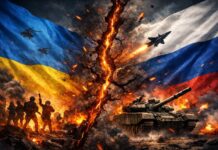Federal move sparks political backlash as tensions escalate in predominantly Latino communities
In a stunning escalation of domestic unrest, President Donald Trump has ordered 2,000 National Guard troops to deploy to Los Angeles, following violent clashes between federal agents and protesters over a wave of immigration raids across the city.
The move, made under federal powers typically reserved for extreme national crises, has drawn sharp condemnation from California leaders, who accused the White House of “purposefully inflammatory” tactics designed to provoke unrest.
Tensions Boil Over After Mass ICE Raids
The unrest stems from a dramatic surge in Immigration and Customs Enforcement (ICE) operations in Los Angeles, part of Trump’s revived campaign promise to carry out mass deportations of undocumented migrants. In recent weeks, ICE arrests under Trump’s new term have exceeded 100,000, with 118 arrests in LA alone this past week, including 44 on Friday.
Protests erupted in several Latino-majority areas, including the city of Paramount, where demonstrators clashed with federal agents and local law enforcement. Videos from the scene show fireworks launched at officers, burning vehicles, and looting in isolated incidents.
In total, one person was arrested, several detained, and two sheriff’s deputies injured, though local officials say the worst of the violence has now subsided. The LA County Sheriff’s Department confirmed that unlawful assembly orders had been issued after crowds blocked traffic and vandalised property.
A Federal-State Standoff Over National Guard Deployment
The deployment of the National Guard, which typically requires state approval, has ignited a fierce legal and political dispute. Governor Gavin Newsom blasted Trump’s use of Title 10 authority to federalise the Guard, calling it a “dangerous spectacle” designed to sow division.
“This is not about public safety—it’s about political theatre,” Newsom said, warning that federal intervention could further inflame tensions in the city’s vulnerable communities.
Mayor Karen Bass confirmed that National Guard troops had not yet arrived in central Los Angeles and reiterated her opposition to the immigration raids, which she said were “sowing terror.”
Meanwhile, US Defence Secretary Pete Hegseth warned that active-duty Marines could be deployed next if the unrest continues—a statement that Newsom described as “deranged behaviour.”
Protests Rooted in Deep Local Concerns
Los Angeles has long been a city where immigration is deeply entwined with identity. According to local journalist KJ Hiramoto, the arrival of federal agents with “no local ties” was seen as a provocation in many Latino neighbourhoods.
“In LA, immigration is not just policy—it’s personal,” Hiramoto told the BBC.
Protests have centred not only on the ICE raids themselves but also on the arrest of prominent labour leader David Huerta, president of the Service Employees International Union (SEIU) California, which represents more than 750,000 workers.
The ACLU condemned Trump’s actions as an abuse of power and warned that deploying the military for civilian policing puts both residents and troops at “legal and ethical risk.”
Trump Doubles Down
Undeterred by the backlash, Trump praised the National Guard and attacked protesters as “radical left troublemakers,” vowing to ban face masks at future demonstrations.
“From now on, MASKS WILL NOT BE ALLOWED to be worn at protests,” Trump posted on social media, even as questions remain about whether the National Guard had, in fact, arrived in LA at the time of his statement.
His Border Czar Tom Homan, personally overseeing ICE operations in LA, declared “zero tolerance” for any violence against federal agents or property.
A Precedent with Echoes of History
The move is drawing historical comparisons to the 1992 LA riots, when President George H.W. Bush used similar powers to federalise the National Guard after the acquittal of police officers in the beating of Rodney King.
Legal experts warn that Trump’s latest order may face court challenges, as the use of federalised troops without state consent remains a legally grey area.
California officials insist they have the capacity to maintain order with local forces. Attorney General Rob Bonta called the federal action “unnecessary and counterproductive.”
A Calculated Gamble with National Stakes
Trump’s decision to escalate the situation in Los Angeles reflects a calculated political gamble. By framing the unrest as a law-and-order crisis, he seeks to galvanise support among his base ahead of the 2026 midterms and showcase the toughness of his immigration agenda.
However, the risk is substantial: militarising a domestic policing operation could backfire if violence worsens, and it further strains relations between federal and state authorities.
As more protests are expected to continue, the question remains whether Trump’s intervention will restore order or deepen the divide in a city already on edge.




